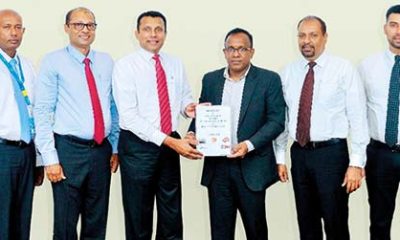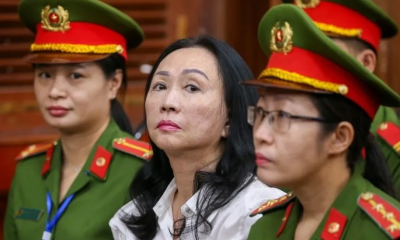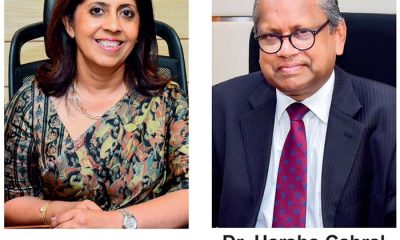Features
Two deaths, no weddings: An ancient Wewa in danger
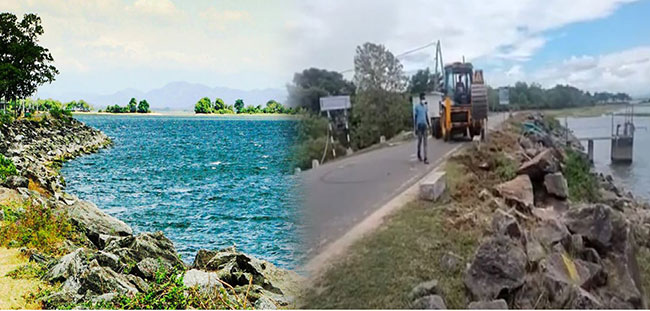
We sincerely and very sadly mourn the death of Susil Siriwardena and Mangala Samaraweera. Cass echoes Macbeth from her most favoured Shakespearean tragedy:
“(They) should have died hereafter; there would have been a time for such a word.” Especially true of the demise of Mangala at age 65.
Death of two outstanding Sri Lankan VIPs
Many fine appreciations were written by those who knew Mangala Samaraweera well and published in all our newspapers. His many character facets were highlighted but the sharpest were his telling it as it should be, and his successes, not because he was one time Minister Samaraweera from Down South but success as a clear-thinking politician who latterly stood up for rights and truths. To Cass, the most endearing trait was his love and devotion to his mother Khema, so beautiful in face and figure and personality. Cass remembers Khema and three children living in the upper storey of a huge house in which Cass occupied an annexe. Mangala was around 11, clinging to the fall of Khema’s saree. A tiny but telling anecdote. Son of Cass said that it was Mangala, older than him, who introduced him to Tin Tin books. He also said, “I was facilitating a VIP conference to which Mangala came as Finance Minister of Sri Lanka. He walked up to me and chatted about our families. I was surprised he recognised me after so many years.” That was the unassuming gentleman Mangala was.
 Cass strongly approved of two statements of his: “I am a Sri Lankan Buddhist” and “Sri Lanka is no Buddhist country” (or words to that effect). Significances are clear, and the latter statement is gaining veracity as we go down the path of moral behaviour, particularly. The Buddhism the majority of us profess is far removed from the Dhamma preached by Siddhartha Gautama the Buddha. These statements should be remembered and abided by. He also said, “We will never enjoy peace and prosperity until all the communities and citizens of this country feel in their hearts that they are full Sri Lankans, not de facto second class citizens whose existence depends upon the magnanimity of the majority community.”
Cass strongly approved of two statements of his: “I am a Sri Lankan Buddhist” and “Sri Lanka is no Buddhist country” (or words to that effect). Significances are clear, and the latter statement is gaining veracity as we go down the path of moral behaviour, particularly. The Buddhism the majority of us profess is far removed from the Dhamma preached by Siddhartha Gautama the Buddha. These statements should be remembered and abided by. He also said, “We will never enjoy peace and prosperity until all the communities and citizens of this country feel in their hearts that they are full Sri Lankans, not de facto second class citizens whose existence depends upon the magnanimity of the majority community.”
Susil Siriwardena had many appellations attached to his name by writers of tributes to him: ‘Engaged and committed intellectual’; ‘Wants to change the world overnight’; ‘A highly literate radical thinker’; and very much more. An Oxford scholar and genuine intellectual, he always lived simple, straight and honest, sympathizing with the less fortunate by deed more than word. One proof is the Janasaviya Programme under Ranasinghe Premadasa, said to be Susil’s brainchild and, the ‘houses for all’ scheme, promoting it as Chairman of the National Housing Development Authority.
Dr. Dayan Jayatilleke mentions in his tribute in the Guardian a revealing trait: “Susil turned traitor to his class and became a revolutionary. Returning from London, he had clandestine discussions with Rohana Wijeweera and was sympathetic to the JVP’s cause.” For which Susil spent a year imprisoned.
He always dressed simple, though he led a life of refinement descended from ‘Down South near-aristocracy’, as Cass wishes to mention, and married a Kandyan radala beauty. Even at weddings when other men were togged up in three-piece suits or silk national costumes with exotic satakas, Susil wore a white sarong and a plain shirt, yet stood out distinctively. He was of the fast-disappearing breed of true professionals: honest in word, deed and intent, intellectual, suave, courteous, and unafraid to speak the truth.
May-be destruction
Shockingly stunning, seeing on TV massive tractors turning stones on the bund of Parakrama Samudra built between 1153 and 1186 when King Parakrama Bahu I ruled Lanka from his capital Polonnaruwa. Don’t the planners of this rotten, useless scheme to make a promenade or jogging track along the wonderful bund realize it is likely to be dangerous as the mass of water is held captive by an earth banking? Thinking people don’t touch such. But no, a politician’s word, even an ex VVIP’s wishful thinking, is fulfilled by minions in departments concerned. And what had the relevant Cabinet Ministers (approximately three, one supposes, in a bloated Cabinet), PM and President to say? Cass is sure she and you can guess who the main instigator of this vanity project is, to carry a name board. Cass does not think it will curry favour with the Polonnaruwa person. It won’t be a mere jogging path but will soon gather small trading outlets, jostling against each other and further endangering the Wewa containing its sea of water. How many likely promenaders or joggers are in P’nnaruwa, even at the height of a tourist season? This ex, Cass has in mind, apparently sponsors his wealthy sibling who built a massive hotel; grotesquely out of sync with the ancient ruins and the old rest house at the opposite end of the Wewa. No building site rules for VVIPs!
I quote Laksiri Warnakula’s opinion in The Island of Monday, August 30, titled ‘Hands and feet off Parakrama Samudra. “I hope this utter madness will be put to an end without delay and whatever the damage done so far to the bund will be restored and the would–be-costs charged on the key personnel who gave the approval to this project.”
If the project was to give work to labourers, and though the money was allocated to it (by the previous government?), it must be stopped. There are many more vitally necessary building and reconstruction projects to spend money on: Paving roads and building minor bridges to ease the life of remote villagers. Plenty of these are highlighted in the Gammadda program of TV channel MTV.
Money! Money!
Cass has said this recently and dares say it again. The country is in dire straits money-wise and aggravates the situation by printing money excessively. This is due to the governments of present and past over-staffing the public service to repay voters for pushing them into Parliament and positions of power. I mean here the ‘chit for jobs’ system. It is useless bemoaning that salaries of public servants and pensions cost over 1.2 trillion rupees while State earnings are 1.4 trillion, thus leaving a meagre 200 billion for health, education, salaries and all else. (As reported in The Island of August 30 by Sonali Wijeratne quoting Dr. Nalaka Godahewa) Did the government promise more to teachers very recently? They should not have since teachers broke their pedagogy morals and thronged streets promoting the spread of COVID-19? Pensions should not be stopped or cut as the comparatively small amounts received each month were worked hard for at least 20 years. Why not start government cost-cutting by banishing MPs’ pensions? All Sri Lankans, except present and past MPs, will raise both hands and add a loud YES to this!
Gold and Bronze for Sri Lanka
Heartiest congratulations to 35-year-old soldier, Dinesh Herath, who sustained grievous injuries during the war but beat handicaps by continuing his sport, the javelin throw. He won Gold and broke the existing record in one of the javelin events. He won the Bronze in the 2016 Rio Paralympics and outdid that with his stupendous win in Tokyo. Compatriot Dilan Kodithuwakku won Bronze in another distance javelin event. Double heroes for sure! They brought a gleam of shining light in the prevailing gloom that shrouds Sri Lanka.
Bye for now on that triumphant note and with the strong hope that the present lockdown will ease the terrible COVID-19 situation when we meet again next Friday, preferably in printed copy!
Features
India is holding a mammoth election with nearly a billion voters
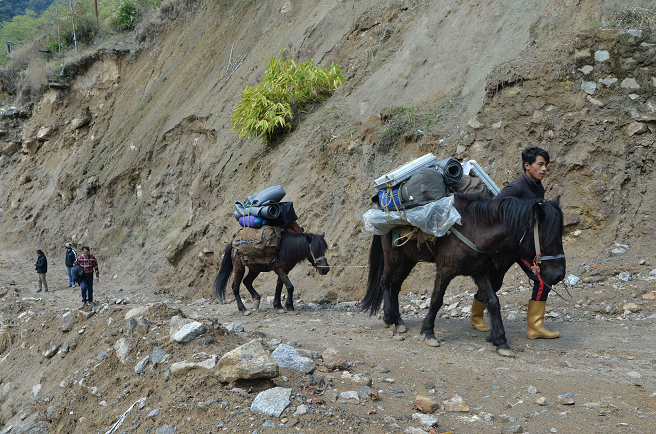
On 19 April, Indians will begin choosing a new parliament for the next five years, as Prime Minister Narendra Modi seeks a third consecutive term. Opinion polls put his Bharatiya Janata Party (BJP) and its allies ahead. They are up against the Indian National Developmental Inclusive Alliance (India), which groups more than two dozen opposition parties including Congress, which was dominant for decades until the BJP took office in 2014.
Scroll down to find out all about the staggering scale of the exercise, the powerful personalities and issues on which the election will be fought:
The election to the lower house (Lok Sabha) is taking place in a bitter atmosphere. The opposition say they have been denied a level playing field, with many leaders raided by federal law enforcement agencies. Congress said tax authorities had frozen its bank accounts for six weeks, hampering its campaign finances. Some opposition leaders, including popular Delhi Chief Minister Arvind Kejriwal, have been jailed on corruption charges they deny.
The opposition has appealed to India’s electoral authorities to intervene but the Election Commission itself has faced questions over its independence. The commission has refused to comment.
Some 969 million citizens are eligible to cast their ballot. To give you an idea, if you add together the populations of the US, Russia, Japan, Britain, Brazil and France – that comes close to how many Indians are on the electoral rolls. Since we are still a bit short, let’s also throw in Belgium.
Nearly 1.5 million polling booths have been set up across the country, with Chief Election Commissioner Rajiv Kumar vowing to “take democracy to every corner of India”.
“Our teams will walk the extra mile to reach every voter, whether they are in jungles or on snowy mountains. We will go on horseback, elephants, mules or helicopters. We will reach everywhere.”Rajiv Kumar, Chief Election Commissioner
While most polling booths are in schools, colleges and community centres, unusual locations are sometimes chosen – like shipping containers, mountain tops or forests. Polling booths are set up even in the remotest corners of the country
And when the commission says “every voter counts”, it’s not just a slogan. In the 2019 general election, five officials traveled by bus and on foot for two days so that a lone voter – a 39-year-old woman in the north-eastern state of Arunachal Pradesh – could exercise her franchise.
The most politically crucial state is Uttar Pradesh (UP). With more than 240 million people, it’s India’s most populous state and sends more MPs to parliament than any other. Analysts say “the way to Delhi is through UP” and a party that does well here is usually well-placed to rule India – eight of India’s prime ministers trace their roots to the state.
The BJP won 71 of UP’s 80 seats in 2014, a figure that dipped to 62 in 2019. Mr Modi, who is from Gujarat, chose UP to make his debut as an MP in 2014. He held his seat in the ancient city of Varanasi in 2019 and aims to do so again this year.
At the other end of the spectrum are three states in the north-east – Sikkim, Nagaland and Mizoram – and the federally-administered regions of Andamans, Lakshadweep and Ladakh, which elect one MP each.
Most of India – 22 states and federally-administered regions – need only one day for voting but some parts take longer. Uttar Pradesh, West Bengal and Bihar will vote in all seven phases.
The elections will decide the fate of thousands of candidates from six recognised national parties – including the BJP, the Congress, Delhi’s governing Aam Aadmi Party and the Communist Party of India (Marxist) – as well as 58 recognised state-level parties. Candidates from many smaller parties will also be in the fray.
All eyes, however, will be on the heavyweights:
Narendra Modi
Prime Minister Modi, who is eyeing a historic third term, remains the frontrunner, with early opinion polls predicting his return. If the 73-year-old wins, he will equal the record of Jawaharlal Nehru, India’s first premier.
A polarising figure, Mr Modi remains a mass leader with millions of supporters who credit him with good governance and improving India’s standing internationally. But critics say his brand of muscular Hindu nationalism excludes minorities and he is out to change the secular fabric of the country.
Mr Modi’s use of religion and religious symbolism has proved potent in a country where 80% of the population is Hindu.
His catch-phrase for the 2024 election is “abki baar, char sau paar [this time we’ll cross 400 seats]”, a target the BJP has set for itself and its allies. A party needs 272 seats to win in India’s first-past-the-post system – in 2019, the BJP won 303.
Amit Shah
The man powering Mr Modi’s election juggernaut is Home Minister Amit Shah. He’s charted numerous successful election campaigns for the BJP.
Like his mentor, he’s a polarising figure. Supporters say he defends the Hindu faith. He is seen as the driving force behind controversial laws, from scrapping Kashmir’s partial autonomy to citizenship legislation that critics call anti-Muslim.
Yogi Adityanath
Mr Adityanath, the shaven-headed, saffron-robed Hindu monk-turned-chief minister of Uttar Pradesh, is considered the biggest mass leader in the BJP after PM Modi. He’s not standing in the general election but is playing a major role in the campaign in the bellwether state.
He’s a holy man to his many followers but critics call him a divisive politician who has used public rallies to whip up anti-Muslim hysteria. During his seven years in office, lynchings and hate speech against Muslims have often made headlines.
Rahul Gandhi
Mr Gandhi, who has never won a national election or been a minister, is the most prominent opposition leader. Most of this is down to his lineage: his great-grandfather Jawaharlal Nehru was independent India’s first PM and his grandmother and father both later served as prime ministers.
But as the BJP has risen over the past decade, Congress has shrunk. Some of the blame has been laid at the door of Mr Gandhi, who critics called “the reluctant prince” in his early years in politics.
Mr Gandhi has undertaken two long marches across India since 2022 He’s worked hard to counter that impression, including taking two long treks across the country aimed at “uniting Indians against hatred and fear”. Nonetheless, opinion polls put Congress well behind the BJP.
Sonia Gandhi
When Congress was last in office a decade ago, Mr Gandhi’s Italian-born mother Sonia was considered the most powerful woman in India. But the 77-year-old has been in poor health and has lost much of her political influence.
She maintains a hold over the party as chairperson. In January, Mrs Gandhi moved to the upper house so she is not contesting the Lok Sabha election.
Priyanka Gandhi
One name that does the rounds before every election is that of Priyanka, Rahul Gandhi’s charismatic sister – although she has never run for parliament.
Resembling her grandmother – former PM Indira Gandhi – she has campaigned extensively for Congress, winning praise for connecting with people. This time, too, supporters are clamouring for her to stand for election. Priyanka Gandhi has a marked resemblance to her grandmother, former PM Indira Gandhi
Arvind Kejriwal
One opposition figure looming over the election is Arvind Kejriwal, Delhi’s firebrand chief minister who is currently in jail.
He made his name as an anti-corruption crusader whose relatively young Aam Aadmi Party (AAP) beat both the BJP and Congress three times in a row to control the capital. It’s also in power in Punjab.
But in March he joined several of his senior party leaders when he was arrested. He’s denied corruption charges and accuses the government of being vindictive. Supporters fear his arrest will dent the AAP’s election campaign.
What will decide how Indians vote?
Will a grand new Hindu temple prove Mr Modi’s trump card? Will the economy, job prospects or welfare schemes be uppermost in voters’ minds? Or will they vote on the basis of caste or religion?
Ram temple
The temple to Hindu God Ram in the northern city of Ayodhya is expected to provide a divine push to Mr Modi’s election pitch by appealing to the majority Hindu community.
The temple – which replaced a 16th Century mosque torn down by Hindu mobs in 1992, sparking riots in which nearly 2,000 people died, was inaugurated with much fanfare by the PM in January.
The event was broadcast live on TV; schools, colleges and most offices were given a day off and people were encouraged to watch the ceremony.
Economy
Could PM Modi’s vow to make India “a developed nation by 2047”, its independence centenary, chime with voters?
India – with its GDP at $3.7tn (£3bn) – is the world’s fastest growing major economy. Last year, it beat the UK to become the fifth largest in the world and is on course to reach $7tn by 2027, which would see it leapfrog Japan and Germany into third spot after the US and China.
But the spoils of India’s boom are concentrated in few hands and inequality remains high. India ranks 140th in terms of global per-capita income and more than 34 million of its citizens live on less than $2.15 a day, even though government data shows “extreme poverty” has reduced a lot.
Jobs
Many voters will be thinking of jobs. Seven to eight million young Indians enter the labour market annually, but millions are unable to find work.
Recent government data shows falling unemployment and a steady increase in labour force participation – to 57.9% in 2022-23 from 49.8% five years earlier. But experts point out most new jobs are low-paying and poor quality – for example in agriculture or women doing unpaid family work.
A telling indication of distress is that millions more are now signing up for the $3-a-day government rural job scheme. Thousands are even ready to migrate to war zones for work.
Electoral bonds
They were meant to clean up murky political financing, but electoral bonds were recently banned by India’s top court, which ruled them “unconstitutional”. The court also ordered the government-run State Bank of India (SBI) to provide details of who bought them and how much parties received.
The fact that the BJP was the biggest beneficiary – securing almost half of bonds worth 120bn rupees ($1.4bn; £1.1bn) donated between 2018 and 2024 – isn’t looking good on Mr Modi’s report card.
Reports have linked many donations to companies being investigated by government anti-crime agencies. Calling it the “biggest scam in Indian history”, opposition parties allege the agencies were used for “extortion”, which ministers have denied.
Welfare
The scale of India’s welfare state is staggering: the Modi government claims it has spent hundreds of billions of dollars to help poor households, reaching more than 900 million people. A number of state leaders have also invested heavily in welfare schemes.
But does that free sack of rice or money to build toilets prompt people to vote for a party? Analysts say such schemes can help, but that they are unlikely to be the only driving factor.
Divisive politics
India has long had religious divisions but critics say fault lines have deepened in the decade since the BJP won power. They say India is becoming a Hindu state where its secular status is increasingly being challenged and its 200 million Muslims – the country’s biggest minority, accounting for some 14% of the population – are marginalised. The government rejects this, saying it is inclusive.
In the last Lok Sabha, the BJP did not have a single Muslim MP. Rights groups and activists also point to increasing violence against Muslims, especially in states governed by the BJP. The government denies accusations it has a divisive agenda and its supporters appear largely unconcerned by such criticisms.
The democracy question
The election comes amid accusations from the opposition, activists and global rights organisations that Indian democracy is under threat. Rahul Gandhi has accused the government of targeting opposition leaders, spying upon them and imposing constraints on parliament, the judiciary and the free press.
Organisations like Human Rights Watch say the Indian authorities have used politically motivated criminal charges, including terrorism, to jail many critics and foreign funding rules to harass the opposition, rights groups and the press – charges the government denies.
(BBC)
Features
From broad principles to problem solving on the ground

Given the importance of the IMF programme to the revival of the Sri Lankan economy, it is incumbent upon the major opposition parties, both of which are front runners to form the next government, to make their stances clear on their economic policies. The JVP in particular needs to make its stance clear as it has a Marxist background that rejected international markets-oriented development in the past. Their economic thinking has traditionally been suspicious of exploitation by international powers with a preference for self-reliant economic development in which the state is the engine of development. However, for that very reason and its image of a radical alternative, the JVP has emerged as the dark horse of national politics in the aftermath of the Aragalaya mass protests that demanded “systems change” in the context of the country’s sudden economic collapse.
by Jehan Perera
The New Year celebrations this year were low key compared to the past. The loud sound of crackers and other fireworks, traditionally accompanying the dawn of the New Year, was less than in the past. The economic burden on the people has begun to tell and was evident in the reduced purchase of new clothes and other items in preparation for the New Year. It can be surmised that the general population has less savings to utilise due to those savings being consumed in earlier months when people’s expenditures exceeded their income. The latest World Bank publication titled ‘World Bank Update: Bridges to Recovery’ released on April 2 shows that poverty has increased over the past four years—from 11 percent in 2019 to almost 26 percent in 2024 in Sri Lanka. According to it, approximately 60 percent of Sri Lankan households have decreased incomes, with many facing increased food insecurity, malnutrition and stunted growth.
In contrast to these ground realities that have eroded the optimism of people to spend on festivities and non-essentials, the run-up to the New Year was accompanied by positive statements of recovery from the international financial institutions supporting the country. According to the Asian Development Bank, Sri Lanka is showing signs of recovery, with green shoots emerging in the second half of 2023 while inflation has decelerated to single digits, foreign exchange reserves continue to be built up, and the exchange rate has appreciated. Furthermore, tourist arrivals and remittance inflows continue to show a commendable recovery while supply conditions have improved. ADB’s growth forecast hinges on the continuation of reforms and better consumer and business sentiment. Timely completion of external debt restructuring will also support Sri Lanka’s debt sustainability efforts.
The gist of the recent statements by the IMF, World Bank and ADB is that the government is taking the IMF programme that they support forward and the country needs to continue on that path. They have pointed out that the macro-economic figures on inflation and budget deficits have been reduced. However, there are also cautionary elements in their communications. One is that the government needs to pay more attention to addressing the needs of those sections of the population who are finding it difficult to make ends meet. The ADB, for instance, has noted that government needs to address the impact on the poor and vulnerable and also continues to implement reforms to address the underlying causes of the crisis.
POLICY CLARITY
The second element in the communications of these major supporters of Sri Lanka’s economic recovery is to point out the dangers of the election cycle disturbing the smooth implementation of the economic reform process. They have expressed concern that the upcoming elections in Sri Lanka could jeopardize the country’s economic recovery programme supported by the IMF. The uncertainty surrounding the elections is causing a potential downward trend in Sri Lanka’s economic outlook. This could lead to a slowdown in the IMF programme and hinder the country’s progress towards economic stability. They also warn that due to the elections, the IMF programme may be extended into the second half of 2024 which can have political consequences.
President Ranil Wickremesinghe’s statement that elections would not be held until the IMF programme is completed has generated concern about whether the presidential elections scheduled to be held in October will be endangered. The international agencies whose main backers are the Western democracies and Japan are unlikely to be advocating that elections should not be held merely to safeguard the IMF programme. Their concern is more likely to be that the government will loosen its current efforts to limit unnecessary expenditures and engage in populist measures such as reducing taxes and increasing subsidies as a means of getting votes. Sri Lanka’s past track record of failing to fully implement its previous 16 IMF agreements is a warning that the government may not follow through on its commitments. The concern would be exacerbated by the fact that both the major opposition parties, the SJB and JVP have said they will renegotiate the IMF programme if they come to power.
Given the importance of the IMF programme to the revival of the Sri Lankan economy, it is incumbent upon the major opposition parties, both of which are front runners to form the next government, to make their stances clear on their economic policies. The JVP in particular needs to make its stance clear as it has a Marxist background that rejected international markets-oriented development in the past. Their economic thinking has traditionally been suspicious of exploitation by international powers with a preference for self-reliant economic development in which the state is the engine of development. However, for that very reason and its image of a radical alternative, the JVP has emerged as the dark horse of national politics in the aftermath of the Aragalaya mass protests that demanded “systems change” in the context of the country’s sudden economic collapse.
SYSTEMS CHANGE
At the present time in keeping with the general consensus among economists and the intelligentsia, the JVP appears to be recognising the importance of the international financial agencies in Sri Lanka’s economic recovery. They have said they will renegotiate the IMF programme, not abandon it. Fiscal targets will need to be met and there needs to be a balance between expenditures and incomes. At the same time there can be a redistribution of the burdens of emerging from bankruptcy that have been put on those who are at the bottom levels of society rather than those at the higher levels. This is evident in the host of newspaper advertisements announcing the forced sale of properties being mortgaged by small and medium businesspersons. The government has chosen not to protect them, giving priority to saving the businesses that are “too big to be allowed to fail.”
The “systems change” demanded by the masses of people is not only economic justice on the lines pointed above but also includes the issue of inter-ethnic justice that is of particular importance to the ethnic and religious minorities. President Ranil Wickremesinghe has been clearest in his analysis of the problem and solution though he has failed to deliver on the solution in his two years as president and earlier years as prime minister. Drawing on his personal experiences, Opposition leader Sajith Premadasa made a remarkable speech recently to a professionals group in which he identified the ethnic, religious, caste and social class cleavages in society. Similarly, JVP leader Anura Kumara Dissanayake has been making speeches in which he provides a comprehensive analysis of the use of narrow ethnic nationalism to win elections, starting from the disenfranchisement of Tamils of recent Indian origin (Malaiyaha Tamils) in 1948.
In his New Year message, the JVP leader broke new ground for a mainstream political party when he referred to ethnic and religious minorities as “nationalities.” The communities in Sri Lanka are not only cultural, religious and linguistic groups, but are also political entities. They all wish to protect their identities and to be treated equally by the Sri Lankan state without discrimination. In describing them as nationalities, the JVP leader was utilising the Marxist political tradition, in which regional self-government is not a negative but a positive. However, the JVP needs to be more specific about what they will actually put in place on the ground to resolve the issue of power sharing between the communities. They also need to deal with their opposing positions and actions in the past. This is no different from the question of what they will do in terms of the economy and with the IMF agreement. These are the nettles that have to be grasped by those who aspire to lead Sri Lanka and bring about the systems change for economic development and national unity. Answers need to be given to convince those in positions of power in business and politics and to those at the bottom who are struggling to make ends meet.
Features
The case for a ‘university’

Once education is ‘dumbed down’ thus, reduced to a process of acquiring a qualification and a set of competencies as evidence of such, there is an easy case for the dismantling of the public university system: “if what you do can just as well be done using less space, less time, less trained teachers, and even online, what is the justification for allocating all these physical resources and the money that goes into sustaining them?”
by Hasini Lecamwasam
 Any meaningful exercise in knowledge production centrally involves investigating the systems of thought that undergird our social, political, and economic arrangements, with a view to changing them to be better for more people. The university’s mandate as a site of critical dialogue, social justice, and struggle for human liberation are closely connected to this function. It is for this reason that all subjects taught in a university, whether in the arts and humanities or STEM disciplines, are supposed to provide a grounding in conceptual investigation that enables one to see through the paradigm that frames knowledge, and projects it as ‘objective truth’, ‘science’ as an expression of it, and so on. In other words, all kinds of training imparted by a university should be based on a critical approach to the politics and relativity of truth and knowledge. However, the gradual incursion of market interests into the university space has contributed towards pushing through changes that undermine this mandate of a university, now increasingly conditioning how those within universities view it as well.
Any meaningful exercise in knowledge production centrally involves investigating the systems of thought that undergird our social, political, and economic arrangements, with a view to changing them to be better for more people. The university’s mandate as a site of critical dialogue, social justice, and struggle for human liberation are closely connected to this function. It is for this reason that all subjects taught in a university, whether in the arts and humanities or STEM disciplines, are supposed to provide a grounding in conceptual investigation that enables one to see through the paradigm that frames knowledge, and projects it as ‘objective truth’, ‘science’ as an expression of it, and so on. In other words, all kinds of training imparted by a university should be based on a critical approach to the politics and relativity of truth and knowledge. However, the gradual incursion of market interests into the university space has contributed towards pushing through changes that undermine this mandate of a university, now increasingly conditioning how those within universities view it as well.
In research, this translates into conducting studies that have the capacity to attract industry actors who can bring in greater funding. However, industry actors in turn are attracted to work that tells them how their profits can increase, rather than research in pursuance of societal wellbeing. This constrains what is possible and, over time, the very parameters of thought in research. In consequence, the focus of research has shifted from investigating conceptual paradoxes (what are called ‘research problems’) to collecting empirical data (‘research questions’), especially in HSS disciplines. Accordingly, criteria for research excellence are evolving to reward information-intensive research that serves simply to reinforce existing social structures and systems by seeking answers to such banal questions as: ‘why do people prefer private universities?’; ‘what is the demand for STEM subjects like?’; ‘what are the perceptions towards the relevance of arts and humanities?’; ‘how to achieve better standards in higher education through quality assurance?’, and the like. Answers to such questions are more and more explored using quantitative methods (KAP surveys, etc.), supplemented by anecdotal qualitative ‘evidence’, which, together, tend to focus on the downstream effects of much larger phenomena, rather than the political and economic dimensions of social problems that fundamentally shape them, as well as any study of them.
These transformations are also reflected in teaching-learning exercises, not least because our research necessarily informs our teaching. ‘Critical’ discussions in classrooms are becoming a regrettably rare occurrence. Instead, most lectures are simple that: lectures, i.e. one-way communications where teachers parrot away information for students to repeat at examinations and scrape off good grades.
The stamp of this sort of uncritical, ‘information-based’ education baked on to several of us manifests in the conservatism with which certain everyday issues are approached, and the highly individualistic not-in-my-backyard syndrome because of which many decide not to engage with them. A few months ago, undergraduates of Peradeniya were told they cannot protest in front of the Senate building, given its historical and administrative significance. This was recently topped off with an even more egregious directive barring them entry into the adjacent pillar area, lest they affront the administration or the visiting public with loud music and, god forbid, public displays of affection. These incidents, and the lack of due outrage on the part of teachers and certain sections of the student body itself, made me reflect seriously on how questions of education, including academic and student life, are understood, and the increasingly restrictive interpretation of the university it signifies.
The boiling down of education, particularly higher education, to a mere qualification necessary for employment, and the consequent chipping away at the conditions that make for a ‘profound’ education – political consciousness, activism, and even love and affection between peers – is happening in a certain context: Sri Lanka’s drive towards education marketisation which has several global precedents, and the consequent policy, funding, and training landscape surrounding higher education globally. In Sri Lanka, successive governments, prompted in no small measure by external funding institutions such as the World Bank, have firstly sought to align education with market demands, and subsequently turn the service itself into a commodity. As a result, education is coming to be understood more and more in cost-benefit terms (whose costs and benefits are both individually accrued, in line with the individualism of the neoliberal market), rather than the overall development of students and society, an attitude that is increasingly internalised by students, educators, and administrators alike.
Once education is ‘dumbed down’ thus, reduced to a process of acquiring a qualification and a set of competencies as evidence of such, there is an easy case for the dismantling of the public university system: “if what you do can just as well be done using less space, less time, less trained teachers, and even online, what is the justification for allocating all these physical resources and the money that goes into sustaining them?” If student activity was to be limited to the classroom, and teachers were to simply cover a given syllabus, if our vision of education is also limited to one of students attending lectures and teachers simply facilitating the process, then we have to agree that we must take up less space and consequently less money.
The plea to return to a culture of critical education is not simply about greater consciousness and activism so students (and perhaps teachers) could inhabit the university space more freely; it is about what such a shift would signify. A ‘university’ is not needed simply to churn out employable graduates. Any training institute squeezed into a five storied building (or less) can do that, without the thought or trouble that goes into creating and maintaining an actual university. Of course, our students need to find employment, and we need to prepare them for that; but what distinctively makes us a university is the critical edge they are supposed to walk away with, that helps them be more than cogs in the wheel. That is the kind of education that would have equipped them – and us as teachers – to rise up with more passion against arbitrary directives seeped in Victorian moralism and red tapism; that is also the kind of education that alone would help us climb out of the current economic pit prioritising human wellbeing over that of macroeconomic indicators.
So, let us dare to do the counter-intuitive, and continue to push agendas of critical research (likely without funding) and critical discussion in classrooms and outside (at the risk of penalisation) within universities because, ironically, the case for the survival of the university itself hinges on that.
(Hasini Lecamwasam is attached to the Department of Political Science, University of Peradeniya)
Kuppi is a politics and a pedagogy happening on the margins of the lecture hall that parodies, subverts and simultaneously reaffirms social hierarchies.
-

 Latest News6 days ago
Latest News6 days agoApril 15 (Monday) declared a public holiday
-

 Sports6 days ago
Sports6 days agoOnly if Buultjens knew that teams have pulled out of rugby sevens!
-

 Business6 days ago
Business6 days agoMallika Hemachndra Jewellers offer a glittering new year with gold and smiles
-

 Business6 days ago
Business6 days agoHNB and Ideal Motors partner up once again to offer exclusive perks on Mahindra automobiles, Powerol generators
-

 News6 days ago
News6 days agoWigneswaran considers himself best Tamil candidate to run for President
-

 Business5 days ago
Business5 days agoVietnamese billionaire Truong My Lan sentenced to death for $44bn fraud
-

 News3 days ago
News3 days agoSinhala and Tamil New Year auspicious times
-

 Business6 days ago
Business6 days ago‘NSB continued to prove its resiliency within economic shudder’


















